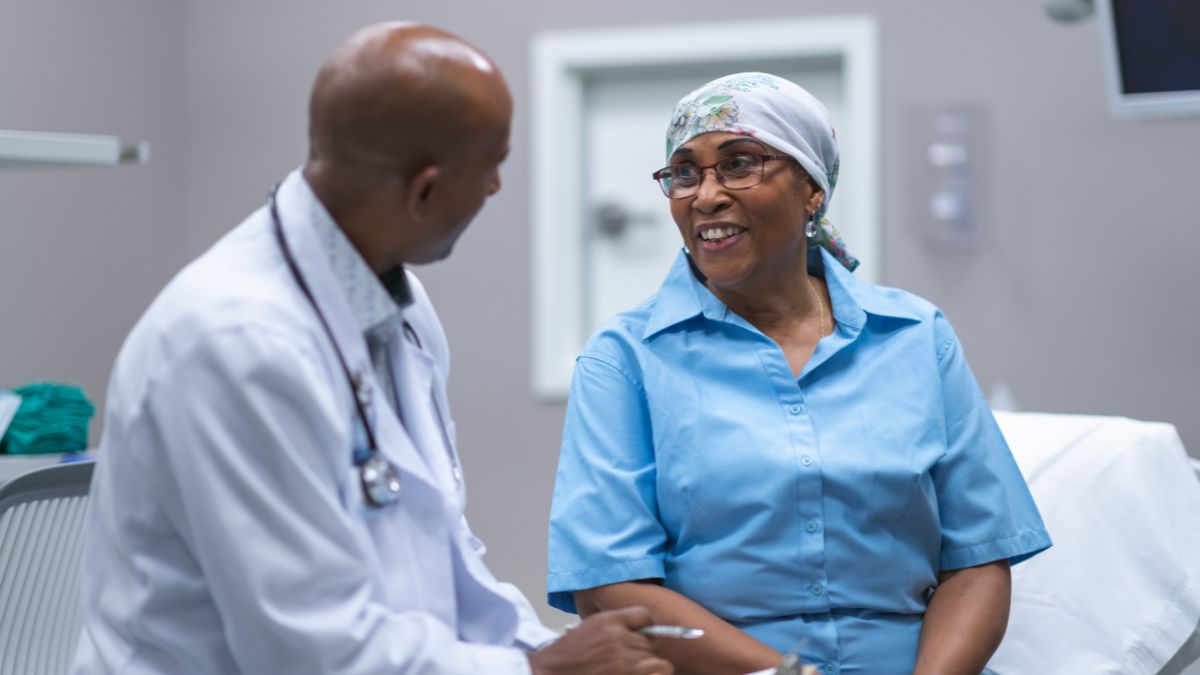Photo Credit: Getty Images
The American Cancer Society’s new report, Cancer Statistics for African American and Black People, 2025, brings some good news and hard truths.
Cancer mortality rates have fallen by 49% in Black men and 33% in Black women since 1991. Still, Black Americans bear a much heavier cancer burden than other ethnic groups.
The report spells out the risks in clear terms: Black individuals face twice the risk of dying from myeloma, prostate, uterine corpus (endometrial) and stomach cancers compared to White individuals.
They also see a 40%-50% higher risk for colorectal, breast, cervical and liver cancers. Survival rates lag behind at nearly every stage—with the widest gaps in melanoma, uterine corpus and cervical cancers. These findings, published in CA: A Cancer Journal for Clinicians and available on cancer.org, reveal uneven progress.
“Overall declines in cancer mortality rates in Black people largely reflect behavioral changes, such as historical declines in cigarette smoking among Black teens, as well as advances in treatment and earlier detection for some cancers,” said Rebecca Siegel, senior scientific director, surveillance research at the American Cancer Society, and senior author of the report. “Yet, this population persistently experiences a much higher mortality burden than other racial and ethnic groups for many cancers. We must reverse course.”
Drawing on fresh data from the National Cancer Institute and the U.S. Centers for Disease Control and Prevention, ACS investigators built the report. Black Americans, who make up about 14% of the U.S. population in 2022, now face an estimated 248,470 new cancer cases and 73,240 deaths this year alone, with cancer standing as the second-leading cause of death after heart disease.
“This report highlights the disparities the Black community has faced for decades. While the decline in cancer mortality rates is encouraging, the stark inequities in incidence and survival for many cancers underscore the urgent need for targeted research and interventions,” said Dr. Wayne A. I. Frederick, interim chief executive officer of the American Cancer Society and the American Cancer Society Cancer Action Network (ACS CAN).
“This is a critical opportunity for the scientific, clinical, and policy-making community to come together to drive meaningful change. Together we must inform strategies to close these gaps, improve early detection, and ensure equitable access to life-saving treatments for the Black community.”
Other highlights in the report include:
- Black men experienced the most significant relative decline in cancer mortality from 1991 to 2022 (compared to Black women and White men and women) at nearly every age, including a 65%-67% drop among those 40-59 years of age.
- The most commonly diagnosed cancers continue to be prostate (44% among males), breast (34% among females), lung (10%), and colorectal (8%), which will account for 58% of all new cancers diagnosed among Black people.
- Black men have a 67% higher prostate cancer incidence rate compared to White men and are more than twice as likely to die from the disease.
- Black women have a 38% higher likelihood of dying from breast cancer compared to White women despite a 5% lower likelihood of being diagnosed with the disease.
- Uterine corpus (endometrial) cancer incidence continues to increase in Black women by 2% per year.
“Future research should not only explore the influence of systemic racism on health, but also develop mechanisms to implement change, including increasing diversity in clinical trials,” added Dr. William Dahut, chief scientific officer at the American Cancer Society. “Given this latest data, it’s also more important than ever to understand how to reduce your chance of getting cancer. This means taking preventative health measures, like understanding your risk profile, maintaining a healthy lifestyle, and keeping up on cancer screenings to catch the disease as early as possible.”
To confront these persistent disparities, ACS launched the VOICES of Black Women study last year. The initiative seeks to unravel the forces behind cancer incidence, mortality, and resilience among Black women in the U.S. It promises to be the largest cohort study of cancer risk and outcomes in this community. For more information and to participate, visit voices.cancer.org.
Other ACS researchers participating in the study include lead author Anatu Saka, Angela Giaquinto, Dr. Lauren McCullough and Dr. Ahmedin Jemal.



